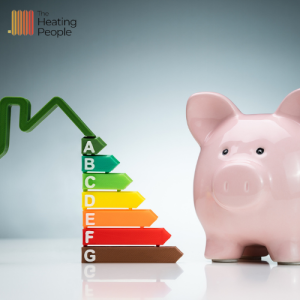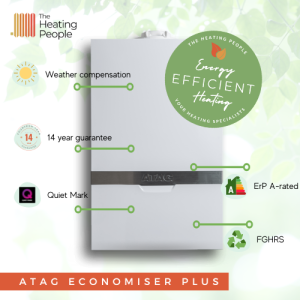 If you’re on the hunt for a new boiler, chances are you’ve come across the phrase: ‘Boiler Plus’. But you might be confused about what it means.
If you’re on the hunt for a new boiler, chances are you’ve come across the phrase: ‘Boiler Plus’. But you might be confused about what it means.
In this blog, we’ll explain what Boiler Plus is; why it came about; and how it’s relevant to you when you buy a new boiler.
Boiler Plus is a new(ish) set of rules on energy efficiency; designed to improve the way you use energy in your home.
It gives you greater choice and control over your energy usage. This results in savings on your energy bills – which is even more important now, given the rising cost of gas!
Why did Boiler Plus come about?
 The Boiler Plus rules came into force in April 2018; following a public consultation into the future of heating in homes. The report was written by the Department for Business, Energy and Industrial Strategy (BEIS) in December 2016.
The Boiler Plus rules came into force in April 2018; following a public consultation into the future of heating in homes. The report was written by the Department for Business, Energy and Industrial Strategy (BEIS) in December 2016.
BEIS found that the energy we use to heat our homes and businesses; currently accounts for around 5% of average household expenses; almost half of our energy consumption; and a third of all carbon dioxide emissions.
The aim of the consultation was to look at ways of cutting bills and carbon emissions; by improving the performance of heating systems. It gives households more choice over how energy efficient devices are used in their homes.
The report led to some significant changes to the regulations on heating manufacture and installation in the UK. These changes have been having an impact on boiler manufacturers, installers, and homeowners since the 6th of April 2018.
Why is the government pushing boiler plus?
 As part of the Government’s ‘Heat in Buildings’ programme, Boiler Plus was created to maximize energy efficiency in homes. This is important because each year in England about 1.2 million boilers are installed in our homes; either for the first time; or to replace an older boiler.
As part of the Government’s ‘Heat in Buildings’ programme, Boiler Plus was created to maximize energy efficiency in homes. This is important because each year in England about 1.2 million boilers are installed in our homes; either for the first time; or to replace an older boiler.
Since our homes account for around a third of our energy consumption; and 15% of all carbon dioxide emissions; it’s perhaps unsurprising that the Government is focusing on increasing energy efficiency at home.
The goal is to improve energy performance in private homes to Band C by 2030; in order to hit the UK’s 2050 carbon reduction target.
Boiler Plus is not the first drive in this area, though. In the 1990s, the UK set minimum performance standards for boiler replacements.
In 2005, UK Building Regulations guidance was amended to set new performance standards for boiler replacement. It mandated the use of more efficient condensing boilers, over their non-condensing counterparts.
More recently, the government has invested approximately £3.6 billion into the Energy Company Obligation (ECO) Scheme. This scheme is intended to help eradicate fuel poverty. Its goal is to upgrade all fuel poor homes to Energy Performance Certificate Band C by 2030 to 2035.
What are the main changes made by Boiler Plus?
 All boilers must now have a minimum ErP (Energy related Products) rating of 92% . And all gas and oil boilers must have appropriate time and temperature controls fitted.
All boilers must now have a minimum ErP (Energy related Products) rating of 92% . And all gas and oil boilers must have appropriate time and temperature controls fitted.
In addition, when installed, combi boilers must have one of four additional energy saving devices fitted: FGHRS; weather compensation; load compensation; or smart controls with automation and optimisation functions.
Any boilers installed without the measures set out in the Boiler Plus standards, will be non-compliant with the Building Regulations.
Some boilers now have some of these devices built-in. All ATAG boilers come with weather compensation as standard. And the ATAG iC Economiser Plus comes with built-in FGHRS. So, this is something you can ask your engineer about during your survey.
Rest assured that The Heating People will recommend the most appropriate Boiler Plus compliant options for your needs.
You might like our related blog: How to choose an energy efficient boiler.
Who does Boiler Plus apply to, and does it affect me?
 Boiler Plus applies to all households in England for boilers installed from April 2018. If you already have a boiler; and it’s in full working order; and regularly checked and serviced; then Boiler Plus won’t affect you until it comes time to replace your boiler.
Boiler Plus applies to all households in England for boilers installed from April 2018. If you already have a boiler; and it’s in full working order; and regularly checked and serviced; then Boiler Plus won’t affect you until it comes time to replace your boiler.
Does Boiler Plus apply to all three types of boilers?
All gas boilers must be at least 92% efficient and include time and temperature controls. However, heat-only and system boilers aren’t required to have the add-on efficiency measures that combi boilers must have. This is because most would need further modifications to make them work with energy saving devices.
Does Boiler Plus apply to oil boilers?
The only rule for installing oil boilers; is that they must have time and temperature controls installed. BEIS is aiming to phase out high carbon fossil fuel heating; like oil; as part of their strategy to reach net zero by 2050.
What happens if homeowners don’t comply with Boiler Plus?
 If you’re a homeowner, and you’re looking for a new boiler, it’s vital that you go to a reputable company. Beware of any installer offering cheap boilers that fall short of the efficiency requirements of Boiler Plus.
If you’re a homeowner, and you’re looking for a new boiler, it’s vital that you go to a reputable company. Beware of any installer offering cheap boilers that fall short of the efficiency requirements of Boiler Plus.
As a homeowner, it’s your responsibility to ensure that your new boiler complies with Boiler Plus. You can be fined up to £5,000 if you knowingly install one that doesn’t. Rest assured that all installations with The Heating People meet all compliance legislation.
What happens if an installer doesn’t comply with Boiler Plus?
 Gas engineers who don’t comply with Boiler Plus are breaching the Building Regulations 2010. They face prosecution and fines of up to £5,000.
Gas engineers who don’t comply with Boiler Plus are breaching the Building Regulations 2010. They face prosecution and fines of up to £5,000.
Building Control polices compliance with Boiler Plus. The Gas Safe Register can also refer safety concerns to the HSE (Health and Safety Executive).
Furthermore, if a gas engineer invoices a consumer for non-compliant work; Trading Standards can take action for fraud.
Will Boiler Plus increase the cost for me?
 In the short term, the provision of an additional energy efficiency measure with any replacement combi boiler; may cause a slight increase in the initial cost at installation.
In the short term, the provision of an additional energy efficiency measure with any replacement combi boiler; may cause a slight increase in the initial cost at installation.
However, here at The Heating People, we offer a variety of solutions, to cover different budgets. In the long term, Boiler Plus aims to ensure that your heating system is running efficiently, so that you are saving on your energy bills.
What options do I have when getting a new boiler with Boiler Plus?
1. Flue Gas Heat Recovery System (FGHRS)
 Flue gas heat recovery systems or ‘FGHRS’ are devices that enable your boiler to reuse or ‘recycle’ heat that would otherwise be wasted as gases out of the flue, to preheat your hot water.
Flue gas heat recovery systems or ‘FGHRS’ are devices that enable your boiler to reuse or ‘recycle’ heat that would otherwise be wasted as gases out of the flue, to preheat your hot water.
This means that you’ll need to burn less fuel to heat your home, saving you money on your energy bills, whilst also reducing your carbon footprint.
Some studies suggest these systems can deliver the same amount of heat while using up to 4% less gas.
The ATAG iC Economiser Plus and the Vaillant ecoTEC Exclusive are two of our favourite combi boilers because they both have in-built FGHRS. This makes them immediately compliant with Boiler Plus with only basic controls.
2. Weather Compensation
 The Heating and Hotwater Industry Council (HHIC) defines weather compensation as:
The Heating and Hotwater Industry Council (HHIC) defines weather compensation as:
‘a control function which maintains internal temperatures by varying the flow temperature from the heat generator relative to the measured outside temperature.’
In other words, weather compensation devices monitor both the temperature inside your home; and the temperature outside; and adjust your boiler’s operation accordingly.
The reason that the outdoor temperature matters; is that the speed at which heat is lost from your home changes depending on the temperature outside. On a cold day, the heat will be lost more quickly than on a warm day.
A weather compensator tells your boiler to increase or decrease the temperature of your radiators; to match the heat loss caused by the weather. So, instead of your boiler switching on or off depending on when your home gets too cold or too hot; weather compensation will monitor and maintain your chosen temperature without having spikes of over and underheating.
This saves energy because it won’t generate more energy than what is required. And you’ll benefit from a more consistent and comfortable environment.
3. Load compensation
 Load compensation controls work in a similar way to weather compensation. They too use intelligent communication between temperature sensors and your boiler.
Load compensation controls work in a similar way to weather compensation. They too use intelligent communication between temperature sensors and your boiler.
But unlike weather compensators; which use an external sensor; load compensation controls use an internal sensor to achieve your desired indoor temperature.
They do this by measuring the difference between the current temperature in your room; and the desired temperature that you’ve set. The controller then tells your boiler to increase or decrease its output to precisely close the gap.
This saves energy because your boiler will only use as much fuel as is needed to close the gap between what your current temperature is; and what you want it to be.
4. Smart controls with automation and optimisation
 Smart thermostats are devices that let you remotely control your home temperature via a tablet; smartphone; or desktop; for greater control over the central heating system.
Smart thermostats are devices that let you remotely control your home temperature via a tablet; smartphone; or desktop; for greater control over the central heating system.
The right heating controls will let you keep your home at a comfortable temperature, without wasting fuel or heat. This will save you money on your energy bills.
Automation controls
Automation is a function that allows the device to automatically control the heating system output; in response to programmed demand (e.g. scheduling with temperature control); or occupancy detection.
An automated heating control system works out whether and when to turn the heating on. It does this based on whether there is anyone in the building, or whether you are approaching the building.
It may use sensors in the home; or it may track your phone’s location to decide when to turn the heating on. This means that you’re not paying to heat your home when you’re at work.
Optimisation controls
 Optimisation, often referred to as ‘learning technology’; is a smart control that turns the heating on at precisely the right time; for your home to be up to temperature at a scheduled time.
Optimisation, often referred to as ‘learning technology’; is a smart control that turns the heating on at precisely the right time; for your home to be up to temperature at a scheduled time.
The device calculates how long it takes your home to reach your desired temperature; and times the system’s operation to minimise the amount of work it has to do.
For example, if you get up at 6.30am in the morning; you can set your programmer to 6.30am; and your thermostat to whatever you choose; and the optimiser will work out when to fire up the boiler. Your house will be up to the temperature you want by 6.30am. In colder weather, it will fire up earlier and in milder weather it will wait, saving you energy and money.
These are known as ‘compensation’ controls and are proven to reduce the amount of gas used by your boiler. Usually, it also modulates the output of the boiler in a similar way to load compensation. This means as little fuel as possible is consumed.
Smart controls offering load compensation or weather compensation would be fully compliant with the Boiler Plus.
What are the typical energy savings of each measure?
 BEIS sets out detailed information on a typical consumer’s costs and energy savings in the first year of operation. We’ve linked to this resource at the end of the blog.
BEIS sets out detailed information on a typical consumer’s costs and energy savings in the first year of operation. We’ve linked to this resource at the end of the blog.
BEIS found that whist the cheaper technologies were appealing to consumers because of their lower initial cost; they had significantly smaller savings on their fuel bills. So, whilst weather compensators and FGHRS have a higher upfront cost, they maximize bill savings over the longer term.
How do I choose which technology to choose?
 The Heating People are experts at finding the perfect controls for your needs and lifestyle. But when you’re thinking about your options; you should consider whether you’re more concerned with reducing upfront costs (and accepting lower benefits); or whether you want to focus on optimising over the lifetime of the technology.
The Heating People are experts at finding the perfect controls for your needs and lifestyle. But when you’re thinking about your options; you should consider whether you’re more concerned with reducing upfront costs (and accepting lower benefits); or whether you want to focus on optimising over the lifetime of the technology.
For cost minimisation, load compensators are your best choice. For benefit maximisation, the highest performing technology on the BEIS choice list is the learning thermostat.
Boiler Plus options at The Heating People
 The Heating People have been installing all the technologies which are featured in the Boiler Plus regulations for many years. So, our experts can guide you to the perfect choice for your home.
The Heating People have been installing all the technologies which are featured in the Boiler Plus regulations for many years. So, our experts can guide you to the perfect choice for your home.
Here are some of the most popular options that we offer our customers:
ATAG iC Economiser and Vaillant EcoTec IQ combination boilers which have built-in FGHRS. This makes them immediately compliant with only basic controls.
Weather compensating controls, where situations allow.
Optimum start and smart controls are a popular choice for many of our customers; as they fit many boilers, and are easy to use.
Please talk to one of our team at The Heating People to find out what’s right for your home.
Useful Links:
Heating and Hot Water Industry Council Installer guide to Boiler Plus
Heating and Hot Water Industry Council article on Boiler Plus innovation for consumers
Government factsheet on Boiler Plus
BEIS Consultation Report on Boiler Plus
Vaillant factsheet on Boiler Plus
Worcester Bosch factsheet on Boiler Plus




